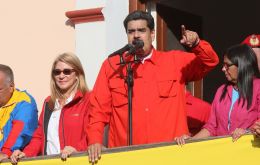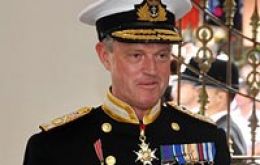MercoPress. South Atlantic News Agency
Tag: Constitution
-
Monday, July 18th 2022 - 07:03 UTC
Fewer Chileans would reject new Constitution; still not enough

A new survey released Sunday in Santiago showed that the number of Chileans who would approve the new Constitution is on the rise against the rejection group, while President Gabriel Boric Font's approval rating has slightly from a slump just a few months after his inauguration.
-
Wednesday, February 20th 2019 - 16:15 UTC
Maduro challenges Guaido to call elections

The head of Venezuela's ruling regime, Nicolás Maduro, asked the head of the National Assembly (AN), Juan Guaidó, recognized as interim president of the same nation by some 50 countries, to call presidential elections on Tuesday. Maduro's challenge is given because he believes he would defeat him and this would put an end to the dispute over the executive power that has marked an institutional crisis unprecedented in the Caribbean country.
-
Friday, January 18th 2019 - 10:12 UTC
Evo Morales’ Bolivia: Abiding the constitution or ensuring the results of sustained economic growth

The Economist has published a piece on Bolivia and its first indigenous president, Evo Morales, who has managed the economy of the continent's poorest country with sustained success during thirteen years. But he has also a strong authoritarian attitude, given his dominance of government branches, and the support of the electorate, mostly indigenous or mestizo. In this scenario, he is running for a fourth consecutive presidential period, which the Constitution bans.
-
Wednesday, May 30th 2018 - 09:39 UTC
Brazilian military “not worried”, with strikers; protests are protected by the Constitution

Brazil's Minister of Institutional Security Sergio Etchegoyen on Tuesday rejected calls to deploy military troops to break up protracted nationwide protests against fuel price hikes. Etchegoyen, a general appointed by President Michel Temer, said such a heavy-handed response was outdated.
-
Monday, April 26th 2010 - 19:59 UTC
Majority of Gibraltarians Consider the Role of The Governor Relevant

A majority of Gibraltarians considers that the role of the Governor is important/ relevant in today’s Gibraltar. That is the conclusion of the recent poll carried out by the Gibraltar Chronicle.
